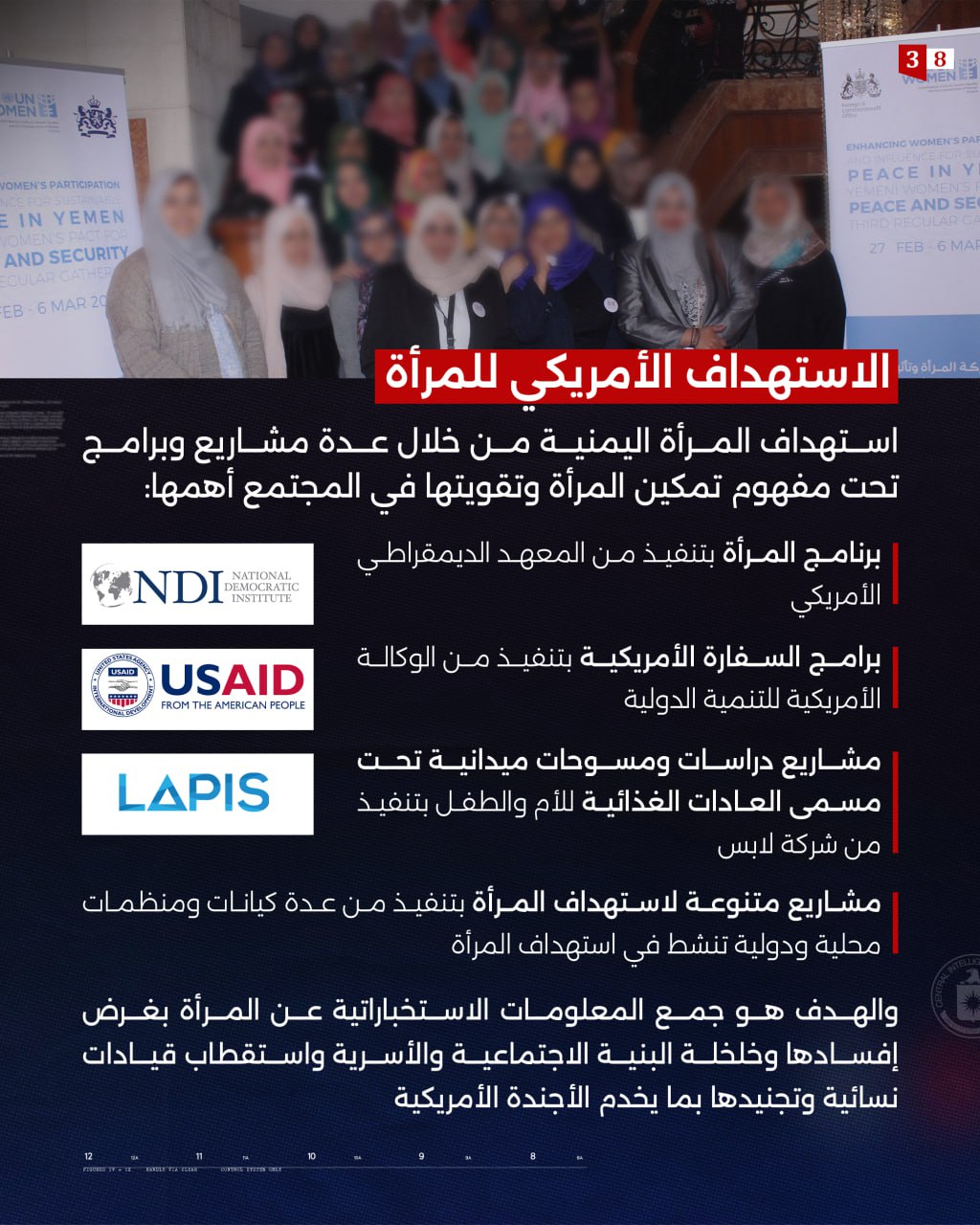Parallel to the destructive American movement within Yemen's youth, Yemeni women, a vital element of Yemeni society, have found themselves at the heart of targeted activities.
Spy confessions reveal a series of fabricated activities by the U.S. and its operatives aimed at entrapping Yemeni women either into recruitment or at the very least, into destruction.
In this context, spy Abdul Moin Azan states, "The women's program at the Democratic Institute, managed by a Dutch expert named Floor Beuming, was ostensibly designed to support women and female leadership. However, it targeted Yemeni women by pushing an American and Western agenda, which included many concepts intended to contradict Yemeni customs, traditions, and even Islamic law. Female leaders were recruited as part of this intelligence operation."
Azan explains that "events organized by the women's program at the Democratic Institute, or the political parties program, involved recruiting the women attending these events. Personal relationships were built between the program leaders and female leaders through invitations and gatherings. These connections enabled the promotion of Western and American values that opposed Yemeni values, ethics, and Islamic law."
Empowerment Programs: Tools of Entrapment
Regarding the targeting of Yemeni women through various programs, spy Abdul Qadir Al-Saqqaf highlights that women were targeted by numerous programs and ideas, such as women's empowerment and freedom. This included the notion that women should participate in political and social life. He confirms that specific organizations supported these ideas and provided backing. These included youth organizations often run by women, with young men and women working together.
Spy Jamal Sultan confirms that targeting Yemeni women involved adopting and funding programs under the guise of empowering women, strengthening their societal roles, and building their capacities in language, management, human rights, and political and community activism through organizations.
Sultan further explains that women were targeted through education programs from the school level, with dedicated programs focusing on concepts like citizenship, gender equality, and women's quotas, highlighting the extensive American activity within Yemeni society, particularly among women and girls.
He points out that one of the American objectives in Yemen was to target Yemeni women and strip them of their identity through mixed-gender training sessions and supporting them in various projects, including artistic and life skills through local organizations, aiming to entrap Yemeni women in an American-designed trap.
Women as Primary Focus Due to War Impact
Spy Hisham Al-Wazir confirms that a significant focus was placed on women because they were considered the largest segment affected by the war. Women who lost family members in the conflict often became responsible for supporting their households due to the loss of men in the war. Consequently, there was a focus on them from this angle. Additionally, women played a role in stirring social unrest within homes or through social gatherings, spreading news, rumors, and malicious information. This method was used and relied upon in the programs targeting them.
Undermining Family and Society
Regarding the dubious activities of USAID and its role in targeting Yemeni women, spy Shaif Al-Hamdani reveals, "I was assigned by USAID as the liaison for 'gender' or social gender issues after the departure of the previous officer, Mrs. Hayat Klixner, who operated in Amman. The main goal was to attend meetings of the UN and the EU's Women's Affairs Committee or the International Gender Coordination Committee."
Al-Hamdani adds, "These meetings, led by the UN Women's Division and the EU, involved many donors, including the U.S., Dutch, British, and Danish embassies, German development offices like KFW and GIZ, and various UN organizations."
He explains that these meetings pushed the agenda of empowering Yemeni women under the pretext that they deserved their rights in society. The primary aim was to incite women to rebel against their families, causing societal fractures, leading to family disintegration under the guise of women's freedom. He confirms that this was among the main objectives of these meetings, attended by the spy, who recorded and shared the proceedings with the USAID program office and other employees. These meetings were held every three to four months.
Regional Targeting of Families
Regarding the intelligence activities conducted by "LAPIS" in Yemen, spy Abdul Moin Azan says, "One of our intelligence activities at LAPIS in Yemen involved extensive surveys and studies of Yemeni society." He confirms that the most notable study was on the dietary habits of mothers and children during the first thousand days, funded by UNICEF and executed by the Yemeni Center for Public Opinion Measurement.
Azan adds, "The study covered all Yemeni governorates, ostensibly focusing on women's and children's dietary habits to serve the project's goal. However, it secretly collected extensive political, economic, and social information."
He confirms that the study targeted the region rather than just the family, asking questions about the area's commercial activities, the population's demographics, including the number of children and elderly, serving a broader intelligence purpose.







